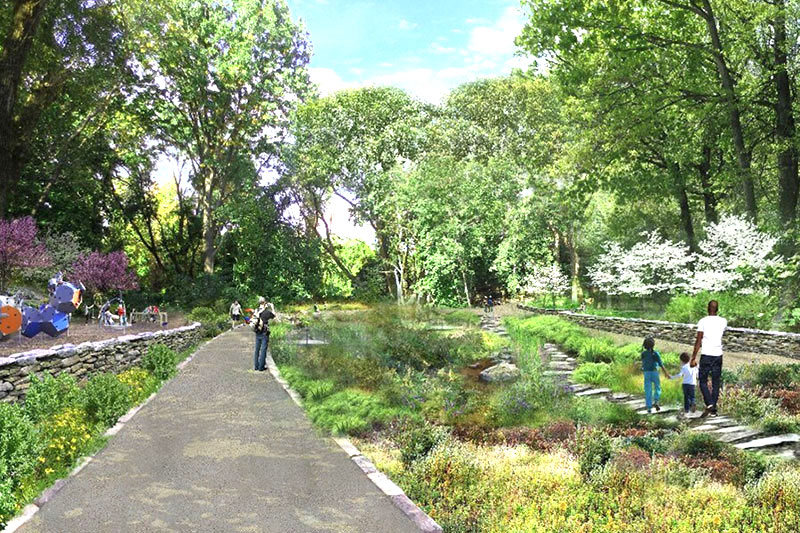
A $117 million federal grant injects new life into the ambitious QueensWay project, aiming to transform a blighted stretch of abandoned railway into a vibrant linear park and cultural greenway in Central Queens. Rendering of the QueensWay. Credit: Trust for Public Land
By MOHAMED FARGHALY
The ambitious QueensWay project, aimed at transforming a blighted 3.5-mile stretch of abandoned railway in Central Queens into a vibrant linear park and cultural greenway, received a significant boost with the announcement of a $117 million federal grant.
The grant, part of the “Reconnecting Communities and Neighborhoods Program – Neighborhood Access and Equity Program” issued by the U.S. Department of Transportation, marks a watershed moment in the initiative’s progress.
Led by the Friends of the QueensWay (FQW) in collaboration with The Trust for Public Land, the project has garnered widespread support from various quarters since its inception in 2011. The conversion of the former LIRR Rockaway Beach Branch into a public park has been championed by local residents, civic organizations, and advocacy groups, with the aim of revitalizing the area and enhancing the quality of life for residents of Queens and beyond.
“In communities like Queens, greenspace is limited, and transportation projects have historically disconnected diverse neighborhoods and discouraged walkability, and QueensWay stands to help change this,” U.S. Representative Grace Meng said.
Mayor Eric Adams hailed the federal funding as a testament to the city’s commitment to fostering community cohesion and investing in transformative infrastructure projects.
“Our infrastructure should be bringing communities together, not tearing them apart, and that’s why we aggressively pursued these Reconnecting Communities grants, to reshape our city in a way that unites us,” Mayor Adams said. “The next phase of the QueensWay will add more greenway miles, vibrant parks, and outdoor amenities to neighborhoods across Queens, and the BQE Corridor grant we won moves us closer to undoing some of the damage that Robert Moses caused and invests in beautiful, interconnected new public spaces.”
The Rockaway Beach Branch, abandoned since 1962, once extended from the LIRR main line at Rego Park through Ozone Park and across Jamaica Bay to the Rockaways. Its construction began in 1877, with services commencing in the 1880s and full completion in the 1910s and 1920s. However, recurring track fires near Jamaica Bay in the 1940s and 1950s made maintenance financially impractical for the LIRR.
In 1955 and 1956, significant changes occurred, New York City acquired part of the line for subway tracks which is now used by the A train, while the LIRR reduced operations due to low ridership. Service ceased entirely on June 8, 1962. Despite numerous attempts to reactivate the RBB, studies consistently deem it infeasible due to high costs, commuter disruptions, environmental impacts, and adverse effects on existing communities.
The $117 million grant will specifically support the Forest Park Pass project, an extension of the QueensWay into Forest Park. This phase of the project will encompass approximately 1.3 miles of greenway, new greenway bridges, recreational amenities, and connections to existing facilities in Forest Park, including Victory Field. Once completed, the QueensWay will comprise 47 acres of new park space and seven miles of greenway, spanning multiple neighborhoods including Rego Park, Forest Hills, Glendale, Woodhaven, Richmond Hill, and Ozone Park.
“My thanks to President Biden and Secretary Buttigieg for establishing this transformational grant program and investing $123 million in federal grants to support our city’s growing infrastructure needs, as well as to all of our city, state, and federal partners who went to bat for New York City,” Mayor Adams said.
The announcement comes on the heels of a $35 million investment for the design and construction of Phase One of the QueensWay, known as the Metropolitan Hub (Met Hub). This initial phase, set to transform a vacant city-owned corridor in Forest Hills into a five-acre park with 0.7 miles of greenway, aims to provide residents with enhanced access to recreational amenities and safe transportation corridors.
The QueensWay project has drawn inspiration from successful precedents such as the High Line in Manhattan, the Atlanta BeltLine, and the 11th Street Bridge Park in Washington, D.C. By repurposing underutilized rail corridors, these projects have not only created recreational opportunities but also stimulated economic and cultural development in their respective communities.
“This innovative project will create a new signature park in the heart of Queens, transforming an abandoned rail line into a vibrant greenspace where New Yorkers can enjoy all the health benefits of time outdoors,’ New York City Department of Parks and Recreation (NYC Parks) Commissioner Sue Donoghue said. “With over a mile of new greenway paths for pedestrians and cyclists, the QueensWay will provide new connections between neighborhoods and give New Yorkers a safe way to get around and enjoy the fresh air.”
While the QueensWay project has garnered broad support, potential criticisms include concerns about environmental impact, accessibility issues, long-term maintenance and funding and levels of community consultation.
With the latest infusion of federal funding, the QueensWay project is poised to enter its next phase of development, bringing to fruition a vision of a dynamic urban green space that promotes health, connectivity, and community engagement.
“Friends of the Queensway has been advocating for our communities and activation of this rails to trails project for more than a decade, and we commend federal and city leaders for collaborating on this extraordinary investment to activate quality park space and parks access,” Friends of the Queensway said.
For more information on the QueensWay project and upcoming developments, visit thequeensway.org.



